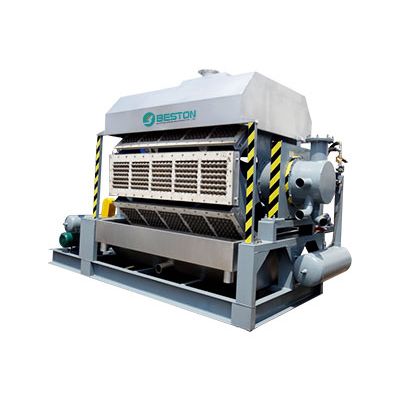

- Home
- Companies
- Beston Group Co., Ltd.
- Articles
- The Future of Egg Tray Machine: Egg ...

The Future of Egg Tray Machine: Egg Tray Machine Supplier in Action
The egg tray machine has proven itself indispensable in modern packaging and manufacturing, particularly within the poultry industry. As industries evolve and sustainability becomes a primary focus, the future of egg tray machines looks promising, marked by technological innovations and an expanding range of applications. Egg tray machine suppliers are increasingly adopting cutting-edge technologies to enhance the functionality, efficiency, and environmental impact of these machines. The next generation of egg tray machines will offer advanced features that improve production capacity, reduce energy consumption, and promote the use of recyclable materials, further solidifying the role of these machines in eco-friendly manufacturing.
Technological Advancements in Egg Tray Machines
The most significant trend shaping the future of paper pulp molding machine is the integration of automation and smart technology. With the development of fully automated systems, egg tray machines are becoming more efficient and easier to operate. Automation eliminates the need for manual intervention, reducing labor costs and the risk of human error. This also results in more consistent production quality, ensuring uniformity in the size and structure of egg trays.
Furthermore, machine intelligence will be increasingly incorporated to monitor the production process in real time. Sensors and IoT (Internet of Things) technology will enable egg tray machines to detect issues before they arise, such as pulp inconsistencies or mechanical malfunctions, allowing for predictive maintenance. This shift towards smart manufacturing will enhance the machine's reliability, reduce downtime, and improve overall operational efficiency, helping manufacturers increase output while maintaining high product quality.
Energy Efficiency and Sustainability
In an era where energy conservation is paramount, the future of egg tray machines will place a strong emphasis on energy-efficient designs. Modern machines are being engineered to minimize energy consumption during the production process. Energy-saving mechanisms, such as optimized heating systems and low-power motors, will become standard in egg tray machines, allowing manufacturers to significantly cut energy costs and reduce their carbon footprint.
Egg tray machines of the future will also incorporate renewable energy solutions, such as solar panels or wind turbines, to further reduce reliance on non-renewable energy sources. This integration will enable manufacturers to operate more sustainably, meeting global environmental goals while lowering operational costs. Additionally, egg tray machine suppliers will focus on designing machines that can efficiently process a wider range of recyclable materials, including agricultural waste and post-consumer paper. This will contribute to a circular economy by reducing waste and providing manufacturers with a more sustainable raw material source.
Material Flexibility and Innovation
Another area where the future of egg tray machines will see growth is in the range of materials they can process. Traditionally, these machines have relied on paper pulp as the primary raw material, but advancements in material science will allow them to work with a variety of fibers. By utilizing materials such as agricultural byproducts, such as rice husks or corn stalks, egg tray machines will help manufacturers reduce waste from farming processes and lower material costs.
As egg tray machine suppliers innovate, machines will become more versatile, able to process alternative materials with ease while maintaining the same high-quality output. The inclusion of non-traditional materials will open up new markets for egg tray machines, from industries that produce organic waste to those that seek alternative fiber sources for packaging.
Expanding Applications Beyond the Poultry Industry
While the primary use of egg tray machines has been in the poultry industry, their capabilities are expanding into other sectors. The eco-friendly nature of molded pulp products makes them ideal for various packaging applications, from consumer goods to electronics. Egg tray machines can be adapted to produce trays, boxes, and dividers for industries that require protective packaging for fragile products.
The rise of e-commerce and the increasing demand for sustainable packaging are driving the need for molded pulp solutions across multiple industries. Egg tray machines will continue to evolve, offering manufacturers the ability to meet these demands by producing customized packaging solutions that align with sustainability initiatives. As the demand for eco-conscious alternatives to plastic packaging increases, egg tray machines will be integral in providing viable solutions for businesses looking to reduce their environmental impact.
Conclusion
The future of the egg tray machine is characterized by greater efficiency, sustainability, and versatility. With advancements in automation, energy efficiency, and material processing, these machines will continue to evolve to meet the growing demands of the global market. As egg tray machine suppliers embrace these innovations, manufacturers will benefit from enhanced productivity, reduced operational costs, and a more sustainable production process. The future of egg tray machines lies in their ability to adapt to new materials, industries, and environmental goals, positioning them as key players in the ongoing shift toward sustainable manufacturing practices.
